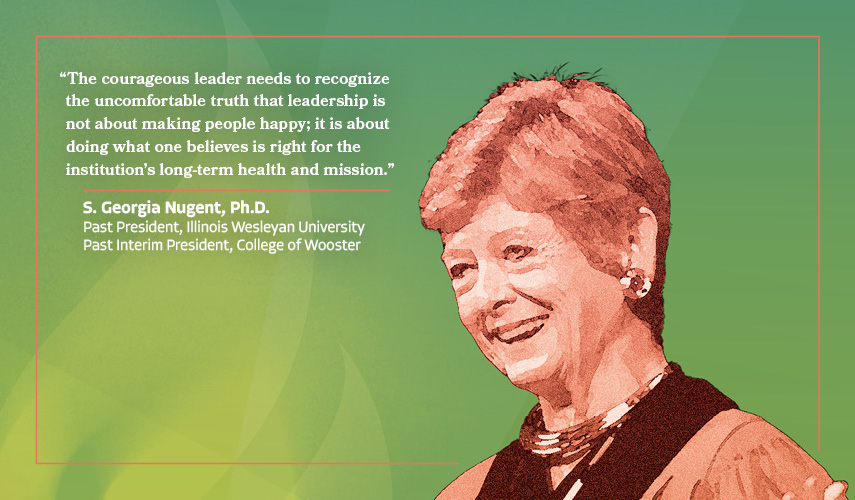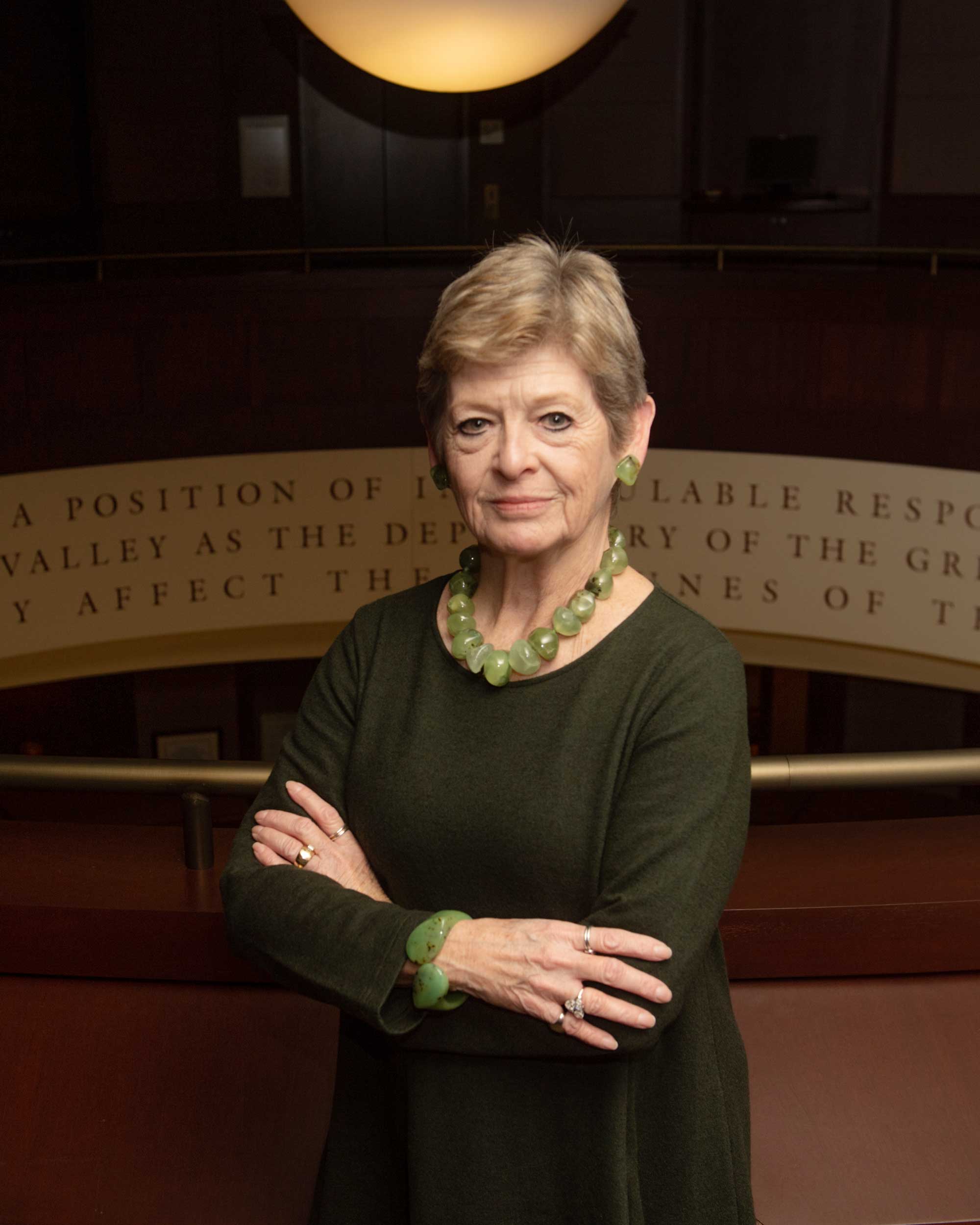
Courageous Leadership
The Power of Self-Awareness
The Compass Within
To become an effective leader, I believe the first step is to cultivate a deep and honest understanding of yourself. Self-awareness is a cornerstone of successful leadership, because it enables a clear assessment of your own strengths and weaknesses, your blind spots, and “hobbyhorses.” This reckoning is invaluable in forming an effective team and in making thoughtful decisions about allocating your energies.
The insights of others can be valuable as well. A colleague of mine repeatedly turned down urgings from a search consultant to apply for a presidency; she was very satisfied in her provostial role. Eventually, she asked herself, “What do they see in me that I don’t see in myself?” When I met her, she was serving as a very successful university president.
The courageous leader needs to recognize the uncomfortable truth that leadership is not about making people happy; it is about doing what one believes is right for the institution’s long-term health and mission

By S. Georgia Nugent, Ph.D.,
Past President,
Illinois Wesleyan University (IL)
and
Kenyon College (OH);
Past Interim President,
College of Wooster (OH)
In my case, this kind of personal SWOT analysis of my own strengths, weaknesses, opportunities, and threats led me to realize that I am, fundamentally, a big-picture thinker. While I value organization and attention to detail, experience has shown me that my strengths lie in strategizing about the future and envisioning possibilities for institutional transformation. Recognizing this means that it’s important for me to surround myself with colleagues who complement those strengths with their own diverse types of expertise. A wise leader builds a team that brings together multiple perspectives and skills, such that the whole really is greater than the sum of the parts.
But to be not just an effective, but a courageous, leader you need to go beyond an accounting of strengths, weaknesses, and personal preferences to identify and articulate your own values, ideals, aspirations, and sense of purpose. When we speak of courage in a leader, we are most often recognizing someone who is able to stand fast in spite of adversity or opposition, someone who takes bold action, even in the face of others’ skepticism or discouragement. Such a leader, we often say, has “the courage of her convictions.”
To be such a leader, you need to be clear about those convictions, about your own “moral compass.” Without that, it is easy to lose direction. What principles, values, beliefs are absolutely non-negotiables? And why? Are some “nice to have” but potentially negotiable? If so, how far is compromise acceptable? And why? If you’re confronted with a choice between your personal values and those of the institution, how can you proceed?
It may seem hyperbolic to pose these questions. Does leading a college really necessitate wrestling with such weighty moral dilemmas? Yes, it does. This was self-evident during the COVID pandemic, when leadership required literally life-and-death decisions. But in many less obvious ways, leadership of an institution is continually — through choices and decisions — either supporting or diminishing the health of that institution. Making those judgment calls, guided by your own moral compass, is difficult enough in itself. But your judgments don’t exist in a vacuum.
Navigating Adversity
In my experience, no leadership decision of consequence meets with universal approval. Furthermore, those who agree typically remain silent, while those opposed voice their disagreement. And in today’s communications environment, that dissent can become very public and painful — for the institution you serve, for you. The question is: Are you prepared to stand by your principles when tested?
During my presidency at Kenyon College, we faced an interesting situation that illustrates the tensions that can arise. A prominent evangelical leader asked to hold a religious event in our newly built athletics facility. Our institution, though secular, had made a commitment to engaging with the local community, and I saw this as an opportunity to strengthen those ties. But the decision sparked immediate controversy — from both the town’s religious leaders and from faculty members. Some pastors were outraged that, in line with our values of free expression, peaceful protest would be permitted. From them, I received threats of eternal damnation. Some outspoken faculty, on the other hand, were deeply concerned about hosting a Christian revival on campus; they urged me to cordon off pathways, so that the event attendees and campus members need not come into contact.
I stood firm in the belief that higher education must champion open dialogue and diverse perspectives. I addressed the faculty directly, invoking a passage from the play A Man for All Seasons, in which Sir Thomas More argues that to deny rights to one’s ideological opponent is to set a precedent that will ultimately erode everyone’s freedoms. The event proceeded, with very mild protest, and the institution remained faithful to core educational values. Courageous leadership is about making the hard calls and owning the consequences.
At Illinois Wesleyan University, the decisions were considerably more difficult. Facing financial constraints, I initiated a process to assess and, if necessary, restructure academic programs. The group carrying out the process was entirely composed of faculty. They conducted a rigorous, data-driven review with hard work and integrity, producing a 60-page report that outlined which programs should be strengthened, reorganized, or phased out. Yet when the time came for the university to implement those recommendations, the faculty authors of the report publicly repudiated it, indicating that they had not expected consequences to follow their recommendations. I was left to make the necessary cuts, knowing full well the backlash that would follow.
And, it did. My decision made the front page of the Chicago Tribune. Alumni sent thousands of petitions in protest. Faculty held demonstrations. And yet, the institution’s long-term viability required decisive action. If we had not acted, financial instability could have compromised the future of the entire university.
The Cost of Courageous Leadership
The reality is that courageous leadership often comes at a personal cost. In today’s climate, where every decision is scrutinized, and social media amplifies dissent, the weight of leadership has never been heavier. The courageous leader needs to recognize the uncomfortable truth that leadership is not about making people happy; it is about doing what one believes is right for the institution’s long-term health and mission. At times, that means standing alone. It means absorbing criticism, knowing that well-intentioned actions can be misconstrued, and, sometimes, weathering personal attacks. The strength to do this comes from unshakeable belief in the value of the enterprise.
The Call for Clarity and Courage
Today, higher education is at an inflection point; stakes have never been higher. We face existential challenges: the broken business model of tuition pricing, the rising skepticism about the value of a degree, the increasing political assault on academic institutions, and more. There are no easy answers. These are not problems that will be solved with platitudes or incrementalism. They require bold, clear-eyed leadership willing to challenge the status quo.
Presidents must resist the pressure to be all things to all people. We must clarify what higher education truly stands for — the pursuit of knowledge, the empowerment of individuals through learning, and the betterment of our society. To advance these ideals, we must be willing to make difficult decisions, even when they come at a cost.
For those who aspire to leadership: define your values before the moment of crisis arrives, because it will arrive. Prepare for voices of opposition, but do not let them drown out your own moral compass. And above all, have the courage to lead, not in any expectation of praise or popularity, but seeking a better future for the institutions and students we serve.

